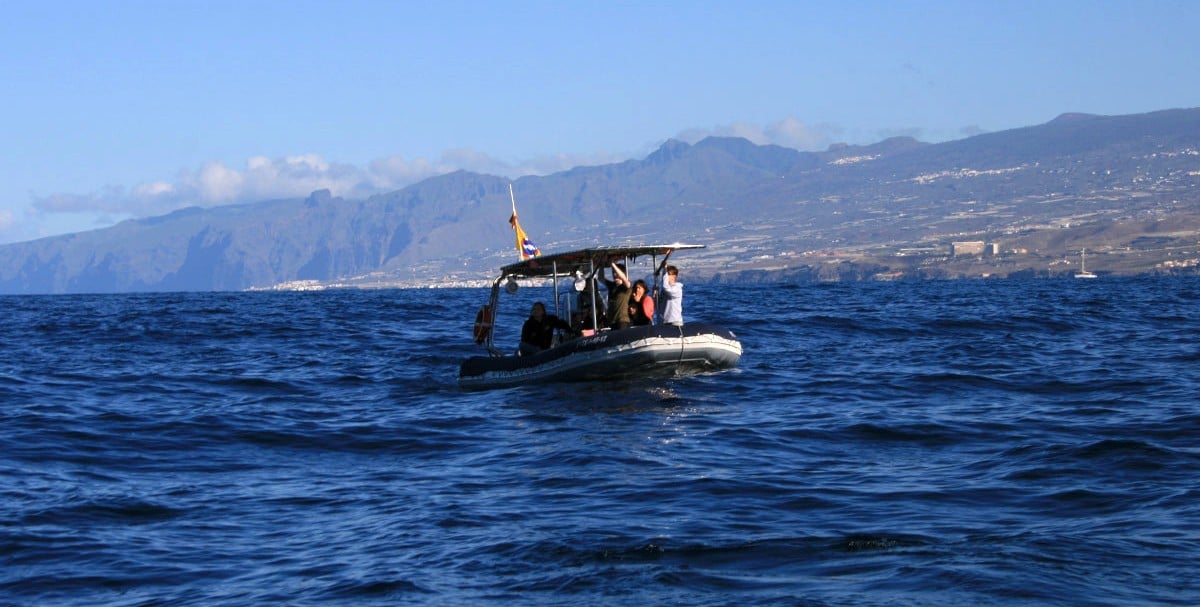Volunteer in the Canary Islands, Spain
Dive with dolphins in Tenerife.
The Canary Islands is a volcanic archipelago off the western coast of Africa and its oceans are home to some of the most interesting marine life, including whales and dolphins – which are our main focus in the area. In addition to living and working in one of the world’s most spectacular island habitats, you’ll gain invaluable – and practical – marine conservation skills.
Volunteer in the Canary Islands and see the loggerhead sea turtle peacefully gliding between the sandy ocean floor and its sunkissed surface, and watch pods of Atlantic spotted dolphins socialising with their bottlenose counterparts.
From our island research station in Tenerife, you’ll even spot the usually nomadic short-finned pilot whales that settle down between the islands of La Gomera and Tenerife. And as a volunteer for cetacean conservation – dolphin and whale conservation – you’ll be a part of efforts to conserve these species and their marine habitats.
Volunteering in the Canary Islands, Spain
Tenerife alone welcomes up to five million eager tourists a year, who come from across the world to see the island’s biodiversity. These include marine animals like whales, dolphins, sea turtles, as well as other marine life. But, too many feet treading the island and its beaches means that the natural biodiversity is interrupted by an influx of tourism, boat traffic, overfishing and excess waste on the island shores.
A partnered approach
As a volunteer in Spain, you’ll work collaboratively with GVI and local organisations to contribute to dolphin and whale conservation in the area. Working with REDPROMAR and CEMAR, GVI is actively involved in monitoring the dolphin and pilot whale populations inhabiting the waters around the Teno-Rasca Marine Reserve. Additionally, GVI carries out land surveys to track boat movements, supports beach cleanup activities, contributes to citizen science databases like eBird, CleanSwell, REDPROMAR and iNaturalist, and conducts environmental education and community outreach programs that focus on marine and environmental topics.
Our programs are aligned with the objectives set out in the United Nations Sustainable Development Goals (UN SDGs).
Ethical tourism
Ethical tourism in Tenerife is gaining importance due to the increasing number of tourists visiting the island. GVI is committed to sustainable development and conservation projects, and promotes responsible travel and sustainable practices in Tenerife. Our volunteer in Spain programs focus on marine conservation, responsible whale watching, beach cleanups, and supporting local communities’ sustainable development initiatives.
GVI’s conservation efforts are also led by our badge of ethics, which represents our commitment to responsible and ethical best practices in all of our projects.
An adventure and sun seeker’s paradise
Tenerife has a vibe that appeals to adventure and sun seekers, offering a variety of activities. With its beautiful beaches and sunny weather, the island is perfect for water sports like surfing and paddleboarding, as well as swimming and sunbathing. Tenerife’s volcanic terrain with rugged mountains and valleys is a great destination for hiking, mountain biking and rock climbing. You can also explore the island’s diverse flora and fauna in nature reserves.
Safety and support
GVI takes safety and security seriously, especially when it comes to young volunteers under 18. Before embarking on any program, GVI provides pre-departure training to ensure that participants are fully prepared and equipped with safety and security procedures. During the program, GVI’s trained staff supervise volunteers and provide round-the-clock emergency support. GVI also conducts regular risk assessments and adheres to industry-standard health and safety protocols. With a focus on safety and security, GVI enables volunteers of all ages to enjoy their experience with confidence and a sense of adventure while making a positive impact.
Read more about our support and safety measures here.
How marine conservation volunteering helps
Our marine conservation efforts aim to protect marine creatures, big and small, and the natural life cycle of all life underwater.
GVI Canary Islands dolphin and whale conservation programs set out a few key objectives in our efforts to safeguard marine life:
- We collect data so that experts can assess the populations and behaviour of whales, dolphins and other marine species around Tenerife.
- We contribute to the science of marine conservation projects by publishing our findings.
- We assist with local marine and coastal waste management efforts through activities like beach cleanups.
- We raise awareness about sustainable and ethical tourism practices.
Our programs
Make the most of our unique programs with these exclusively curated local adventure and wellness experiences.
Where can I volunteer in the Canary Islands?
GVI operates in one location in the Canary Islands – Tenerife.
As a marine conservation volunteer in the Canary Islands, Tenerife offers you the opportunity to participate in activities such as ethical whale watching while monitoring and collecting data on marine life. And when you’re on land, you take part in land-based cetacean monitoring, a beach survey or cleanup.
And maybe while swimming after a day of volunteering, you’ll hear the sound waves of dolphins using echolocation to find food or catch a glimpse of a moray eel or a stingray. If you’re really lucky you might catch sight of a critically endangered Bryde’s whale.
Where can I go during my spare time?
The Canary Islands offer you diverse environments, from tropical forests and dry volcanic landscapes to snow-covered peaks.
- Visit a UNESCO heritage sight in Tenerife, the Teide National Park, which holds the Teide-Pico Viejo stratovolcano. The volcano is the tallest point in Spain, reaching up to 3,718 metres.
- Take a boat trip to another island. The fourth-largest of the Canary Islands, Lanzarote, is known for its volcanic craters and beaches decorated with palm trees. This site was even declared a Biosphere Reserve by UNESCO in 1993.
- Walk the meadows of Gran Canaria island or lounge on its white sand beaches. Keep your eyes out for a Gran Canaria giant lizard feeding on island plants and fruit.
- If you’re visiting Gran Canaria for the weekend, you can spend your Sunday roaming the markets in the towns of Teror and San Mateo. Support local businesses by buying goods from vendors and remember to purchase a keepsake for back home.
- If you’re looking for a spot that’s less frequented by tourists, visit the islands of La Palma and El Hierro. See black-sand beaches at La Palma, or walk between the pine, laurel, eucalyptus and chestnut trees in El Hierro.
What type of volunteer work can I do in the Canary Islands?
GVI’s Canary Islands programs focus on the United Nations Sustainable Development Goals (UN SDGs), specifically Goal 4: Quality Education, Goal 6: Clean Water and Sanitation, Goal 13: Climate Action, Goal 14: Life Below Water, Goal 15: Life on Land, Goal 17: Partnerships for the Goals.
We work in cetacean conservation by monitoring and collecting data on whale and dolphin populations as well as other marine species.
As part of our efforts, you’ll assist with photo identification and passive acoustic monitoring of marine animals and determine the source of sounds underwater. When not at sea, you’ll perform plastic pollution research and land-based whale and dolphin spotting. Become an expert using a DSLR camera, hydrophone, telescope and binoculars as you gain hands-on field experience in Europe’s first Whale Heritage Site. All our data is recorded and inputted into various databases. This data helps grow our body of knowledge around dolphin and whale conservation so that we can create sustainable solutions for the survival of these marine animals.
These solutions include recommendations on sustainable tourism practices, fishing regulations, waste management and other guidelines regarding environmental impact.
You can participate in one of the following dolphin and whale conservation programs:
- Whale and dolphin conservation
- Marine biology research and conservation
- Dolphin and whale conservation teen volunteering
- Marine biology internship in the Canary Islands
- Marine conservation research fellowship in Tenerife
The benefits of volunteering abroad
- Skills training: You’ll be trained on data collection and analysis. You’ll also learn how research science works and how to use it to make a contribution to government and organisational decision-making.
- Informative workshops: You’ll learn about the biodiversity of the Canary Islands and how to identify species for monitoring.
- Pollution and waste awareness: You’ll learn about the effect of waste in the ocean and on beaches, and ways to develop sustainable solutions.
- Up your resume: You’ll be able to add a bunch of hard and soft skills to your resume so you stand out from your peers
- Language acquisition: The predominant language spoken in Spain is Spanish. While we don’t offer Spanish classes, you’ll be surrounded by Spanish speakers while you volunteer – from staff members who live on base and local community members that you’ll interact with on our programs.
How old do I have to be to volunteer?
Our programs in the Canary Islands, Spain are available to participants over the age of 18 as well as teens who are interested in being a part of environmental education, cetacean conservation, whale conservation or dolphin conservation.
We offer a specially designed program for teens under the age of 18. GVI has been running ethical and responsible volunteer programs for under 18s since 2012, prioritising the health and safety of its young participants. To ensure the well-being of these volunteers, GVI takes extra measures and has implemented strict protocols that comply with British Standards 8848. These measures include risk assessments, safeguarding policies and 24/7 emergency support.
When can I volunteer during the year?
Whether you’re taking a summer vacation or you’re on a gap year, you can volunteer in the Canary Islands all year round.
For how long can I volunteer in Spain?
GVI offers a range of volunteering programs in Tenerife, with durations ranging from as little as 1 week to as long as 12 weeks. Whether you have just a week to spare or are able to commit to a longer stay, GVI provides an opportunity for you to make a positive impact.
Join GVI in dolphin and whale conservation and make an impact now.






















